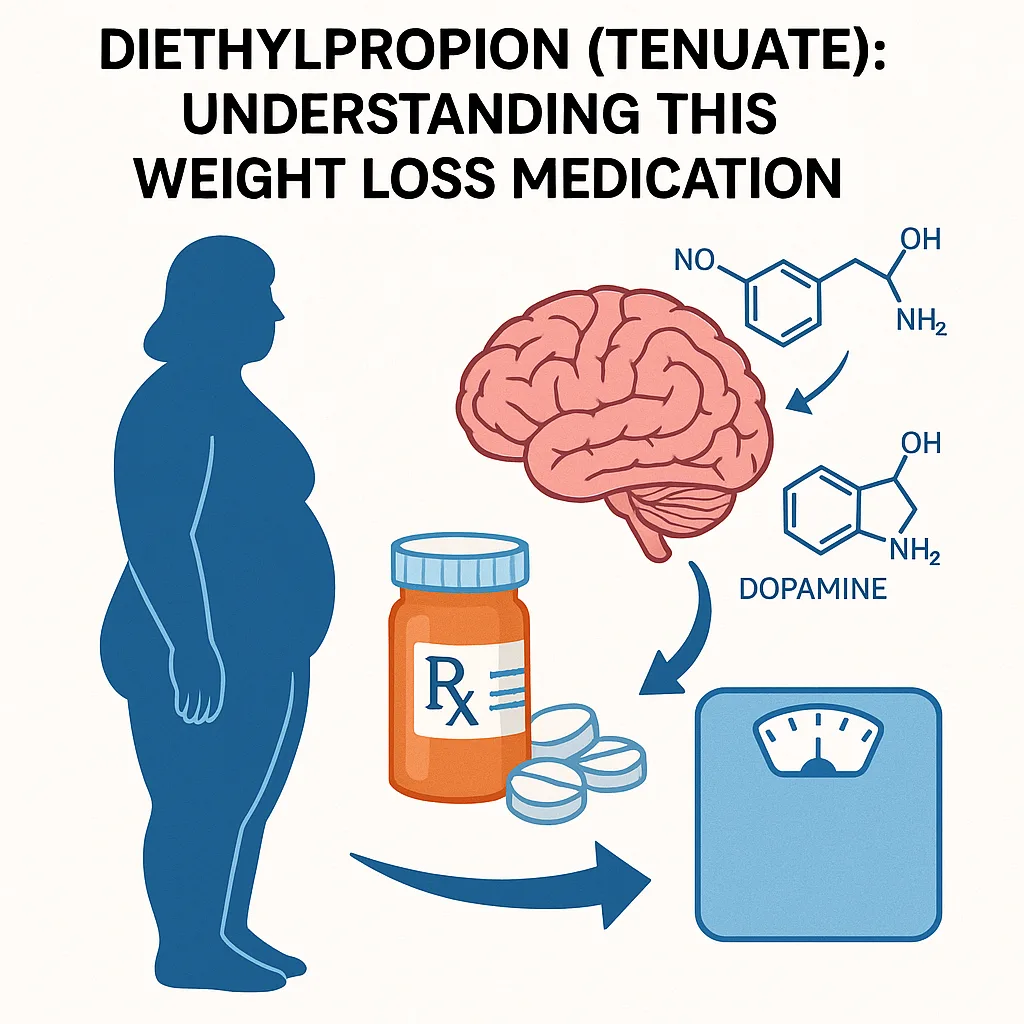Diethylpropion (Tenuate): Understanding This Weight Loss Medication
In the journey to manage weight, various tools and medications are available. One such prescription medication is Diethylpropion, often known by its brand name Tenuate. This article will delve into what Diethylpropion is, how it works, its potential benefits, and important considerations regarding side effects and risks.
What is Diethylpropion (Tenuate) and How Does It Work?
Diethylpropion is a prescription sympathomimetic amine, classified as an appetite suppressant. It acts on the central nervous system to reduce hunger and cravings, helping individuals consume fewer calories. Its mechanism involves increasing the release of certain neurotransmitters in the brain, such as norepinephrine and dopamine, which are associated with satiety and reduced appetite.
Who Is Diethylpropion For?
Diethylpropion is typically prescribed for individuals who are significantly overweight or obese and for whom weight loss is medically necessary. It's generally indicated for:
-Individuals with a Body Mass Index (BMI) of 30 kg/m² or greater.
-Individuals with a BMI of 27 kg/m² or greater who also have at least one weight-related comorbidity, such as:
-High blood pressure (hypertension)
-Type 2 diabetes mellitus
-Dyslipidemia (abnormal cholesterol levels)
-A large waist circumference, indicating central obesity.
It can also be considered in certain cases for obese children who are significantly taller than their peers, though careful medical supervision is paramount. Diethylpropion is intended to be used as part of a comprehensive weight management program that includes dietary changes, increased physical activity, and behavioral therapy.
Potential Benefits of Diethylpropion
When used appropriately and under medical supervision, Diethylpropion can offer several benefits for individuals struggling with obesity:
Appetite Suppression: Its primary action helps reduce hunger, making it easier to adhere to a calorie-restricted diet.
Facilitated Weight Loss: By aiding in appetite control, it can help individuals achieve and maintain weight loss, which in turn can improve various health markers.
Improvement in Co-morbidities: For those with weight-related conditions like high blood pressure, diabetes, or dyslipidemia, even moderate weight loss can lead to significant improvements in these conditions.
Side Effects of Diethylpropion
Like all medications, Diethylpropion can cause side effects. These can vary in severity and may include:
Common Side Effects:
Nervousness or restlessness
Insomnia (difficulty sleeping)
Dry mouth
Headache
Dizziness
Nausea, vomiting, or stomach upset
Constipation or diarrhea
Increased heart rate
Elevated blood pressure
Less Common but More Serious Side Effects:
Palpitations or chest pain
Shortness of breath
Fainting
Changes in mood or behavior (e.g., anxiety, depression, agitation)
Allergic reactions (rash, itching, swelling)
Blurred vision
Tremors
*It is crucial to discuss any side effects with your healthcare provider immediately.
Risks and Important Considerations
Using Diethylpropion comes with several important risks and considerations:
Potential for Abuse and Dependence: Diethylpropion has properties similar to amphetamines, and therefore carries a risk of psychological dependence and abuse. It is a controlled substance and must be used exactly as prescribed, typically for short periods.
Cardiovascular Risks: Due to its stimulating effects, Diethylpropion can increase heart rate and blood pressure. It should be used with extreme caution or avoided in individuals with pre-existing heart conditions, severe hypertension, or a history of stroke.
Pulmonary Hypertension: While rare, there have been reports of primary pulmonary hypertension, a serious and often fatal lung disorder, in patients treated with appetite suppressants.
Drug Interactions: Diethylpropion can interact with various other medications, including antidepressants (especially MAO inhibitors, which are strictly contraindicated), other weight loss drugs, and medications for blood pressure or diabetes. Always inform your doctor about all medications and supplements you are taking.
Not a Standalone Solution: Diethylpropion is a tool to assist weight loss, not a substitute for healthy lifestyle changes. Its effectiveness is maximized when combined with a balanced diet and regular exercise.
Pregnancy and Breastfeeding: It is generally not recommended during pregnancy or breastfeeding due to potential risks to the fetus or infant.
Conclusion
Diethylpropion (Tenuate) can be an effective short-term aid for weight loss in carefully selected individuals struggling with obesity. However, its use requires strict medical supervision due to potential side effects, cardiovascular risks, and the potential for abuse. If you are considering Diethylpropion or any other weight loss medication, have an open and thorough discussion with your healthcare provider to determine if it's the right choice for your individual health profile and weight management goals. They can help you weigh the potential benefits against the risks and guide you towards a safe and sustainable path to better health.
Disclaimer: This article is for informational purposes only and does not constitute medical advice. Always consult with a qualified healthcare professional for any health concerns or before making any decisions related to your health or treatment.

